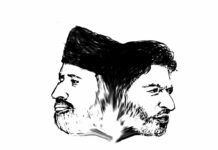Free Kashmir, written in big bold letters was visible from a distance.
As I went closer, I could see hundreds of wishes, written on the wall. No handwriting matched the other. The language also differed. The only thread connecting the wishes was hope.
That summer we had a guest lecturer from Punjab at the university. One afternoon, after her lecture, I and my friend were strolling with her around the university campus. Our guest teacher had heard a lot about Hazratbal shrine and the street foods available in its vicinity. So we decided to show her the place.
While passing through Hazratbal market, she listed some items with intention of buying them on our way back. As we reached the staircase that leads to the shrine, I had a small argument with my friend about climbing the stairs with our shoes on. I wanted to take my shoes off while my friend didn’t want to. The teacher was looking at us, visibly in dilemma about her decision. But soon she took her shoes off, held my hand and we hurriedly climbed the staircase.
My friend also followed. At the threshold. stopped near a white pillar where something was written in Hindi. She went closer and read, ‘‘Wohh meri jaan hai, uski beemari ko duur kar (He/she is my life. Please remove his/her disease).” Soon our eyes met hundreds of such requests and desires that had found their way from yearning hearts to these walls.
Students’ wishes topped the list.
I remember a few. “82647-above 50% marks”, “Please God – M Ed, University” “Pass 2 subjects only”, “First in whole school”.
We found the wishes funny until our eyes stopped at a queer prayer among clutter of roll numbers. “Please solve my son’s handwriting problem”.
We spent a couple of hours reading the graffiti. We could differentiate between the wisher by the wish. “Allah, Aangan waadddi ka order”, “Yaa Allah, Nayib tehsildaar, Aameen”, “Yaa Allah, mujhe naukri dedey kyunki mei yateem aur gareeb hoon (Oh Allah give me job because I am poor and orphan)” – these lines surely should have come from the unemployed hands. While the lines like “just one child to make our family complete” or “Oh Allah please give us just one son” speak the restlessness of childless couples.
Wishes for suitable match for oneself or for one’s children also adorn the walls. “Aye Allah meri Afrooza ki shaadi badey doctor ke sath (Oh Allah, get my daughter married to a big doctor)”, “Allah mere bhayioon ko naukri deke meri shadi jaldi kara (Oh Allah provide jobs to my brothers so that they can get me married soon) and “Mehmooda weds Ishtiyaq please.”
Making marriages was not the only thing. Some had come to break them too. “Gulshan aur Parvez ka nikaah kaat, magar zaroor (break marriage of Gulshan and Parvez, definitely)” was written at the base of the wall, hidden beneath the carpet.
While leaving the shrine, our guest took me and my friend near a wall and wrote something for us as well. We neither objected nor approved. Some days back, when I went to the shrine, the wishes were still there, may be some of them granted as well. Who knows? I spotted the line that was once written for me. I don’t know why but it pleased me. While leaving, I turned back many times to see whether the line was there. It was, but kept fading with the distance. And when I was about to cross the doorsill, it was not visible. The only thing I could read was – Free Kashmir.
Wishes on the walls
SHAZIA YOUSUF















